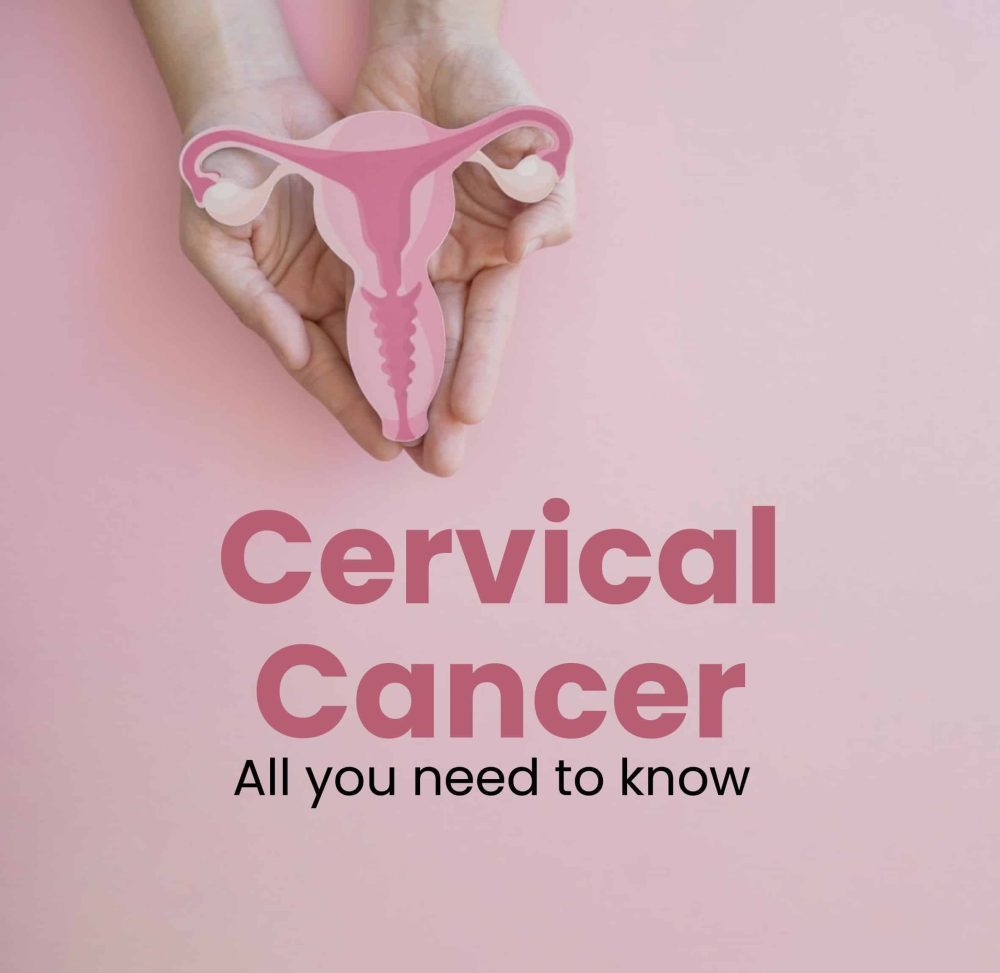
Cervical cancer is a concerning health issue that affects thousands of women worldwide. Here we will provide you with a comprehensive overview of cervical cancer, covering its causes, symptoms, prevention, and treatment options. Understanding these aspects is crucial for early detection and effective disease management.
What is cervical cancer?
Cervical cancer is a type of cancer that develops in the cells of the cervix. This is the lower part of the uterus that connects to the vagina. In most cases, cervical cancer is caused by the human papillomavirus (HPV), a common sexually transmitted infection. When HPV infections persist, it can lead to abnormal cervical cell growth, which may eventually become cancerous.
How it occur?
Cause
The primary cause of cervical cancer is the human papillomavirus (HPV). However, it’s essential to note that not all HPV infections lead to cervical cancer. Certain risk factors increase the likelihood of developing cervical cancer, such as:
Multiple Sexual Partners: Engaging in sexual activity with multiple partners can increase the risk of HPV infection.
Early Sexual Activity: Initiating sexual activity at a young age may elevate the chances of contracting HPV.
Weak Immune System: Individuals with a weakened immune system are more susceptible to HPV infections progressing into cervical cancer.
Smoking: Smoking weakens the immune system and can facilitate the development of cervical cancer.
Symptoms
Cervical cancer may not exhibit noticeable symptoms. Regular screening, such as Pap smears, plays a vital role in early detection. As the cancer progresses, you may face the following symptoms.
•Abnormal Vaginal Bleeding: This includes bleeding between periods, after sexual intercourse, or after menopause.
•Unusual Vaginal Discharge: An increase in vaginal discharge that may be tinged with blood.
•Pelvic pain: Persistent pelvic pain, which may radiate to the lower back.
•Pain during Sexual Intercourse: Discomfort or pain during sexual activity can be indicative of cervical cancer.
If Cancer, already spread to other tissues:
•Painful urination
•Diarrhea
•Appetite
•Unintentional weight loss
•Fatigue
•Swelling in leg
•Abdominal pain
Precautions
Preventing cervical cancer involves various proactive measures that can reduce the risk of HPV infection and the development of cancer. Here are some essential preventive steps:
• HPV Vaccination: Vaccines such as Gardasil and Cervix are available to protect against certain types of HPV known to cause cervical cancer. Vaccination is most effective when administered before becoming sexually active.
• Practicing Safe Sex: Using condoms during sexual intercourse can lower the risk of HPV transmission.
• Regular Screening: Undergoing regular Pap smears or HPV tests, as recommended by healthcare professionals, can aid in early detection.
• Healthy Lifestyle: Maintaining a healthy lifestyle, including avoiding smoking and adopting a balanced diet, can bolster the immune system’s ability to fight off infections.
Treatment
• Surgery: Surgery aims to remove cancerous tissues and may involve procedures like hysterectomy or trachelectomy.
• Radiation Therapy: This treatment utilizes high-energy X-rays to destroy cancer cells.
• Chemotherapy: The use of anti-cancer drugs to target and eliminate cancer cells.
• Targeted Therapy: This approach focuses on specific molecules involved in cancer cell growth.
Screening Age
• Women who are 21 to 29 years old should have a Pap test (Pap smear) alone every 3 years. This test involves the collection of cells from the cervix to check for abnormal changes that might indicate the presence of pre-cancerous or cancerous cells.
• HPV (Human Papillomavirus) testing alone can be considered for women who are 25 to 29 years old, but Pap tests are preferred in this age group. HPV testing checks for the presence of high-risk HPV strains, which are associated with cervical cancer.
• Women who are 30 to 65 years old have three options for cervical cancer testing. They can choose one of the following options:
a. Pap test alone every 3 years.
b. HPV testing alone every 5 years.
c. Co-testing, which involves both a Pap test and an HPV test done together every 5 years.
Cervical cancer is a serious health concern that requires attention and proactive measures. Understanding its causes, symptoms, prevention, and treatment options is crucial for women’s health and well-being. Regular screenings, healthy lifestyle choices, and awareness of risk factors are essential in the fight against cervical cancer. By staying informed and taking preventative measures, we can work towards reducing the prevalence of this disease.